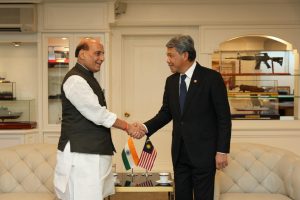With Indian Defense Minister Rajnath Singh’s maiden visit to Kuala Lumpur earlier this week, Malaysia has now hosted ministers from two pivotal Indian ministries in less than two months. In early June, Minister of State for External Affairs V. Muraleedharan met his Malaysian counterparts.
Such visits are intended to signal a high in bilateral relations following the turbulence in 2019, arising from then-Prime Minister Mahathir Mohamad’s remark about Kashmir and India’s Citizenship Amendment Act. The visits this year indicate renewed commitment to elevated ties and deeper cooperation to address new and complex shared challenges.
During the meeting between Rajnath and Malaysian Defense Minister Mohamad Hasan, both sides discussed opportunities to strengthen defense cooperation and enhance the utility of existing mechanisms, such as the India-Malaysia Defense Committee.
Also notable was the signing of the exchange of letters to amend the 30-year-old memorandum of understanding on bilateral defense cooperation. This will enable more bilateral activities between all three military services in the future.
This comes after a significant year for India-Malaysia defense cooperation. The two countries conducted three joint exercises in 2022: air force exercise Udara Shakti, naval exercise Samudara Laksamana, and army exercise Harimau Shakti.
Rajnath and Mohamad expressed a desire to enhance defense-related science, technology and industry cooperation, including on maintenance, repair, and overhaul (MRO). They also mooted the setting up of a strategic affairs working group and a “Su-30 forum” to share information and best practices on operating and maintaining the the Soviet-developed aircraft – which both India and Malaysia operated. The Su-30 forum has been under discussion since Indian Prime Minister Narendra Modi’s 2015 visit to Malaysia.
Another significant but expected development was the inauguration of the first regional office of Indian public sector undertaking (PSU) company Hindustan Aeronautics Limited (HAL) in Kuala Lumpur. This “Navratna” (companies that can invest up to 10 billion Indian rupees or 15 percent of their net worth on a single project without seeking approval from the government) office will be a hub for engagement with the wider Southeast Asian region and act as a gateway for other Indian defense PSUs.
The idea for this office was put forth when HAL took part in a global tender to supply the Royal Malaysian Air Force (RMAF) with fighter jets. While HAL lost out to Korea Aerospace Industries, as a manufacturer of Russian Su-30 fighter aircraft, HAL is still strategically positioned to be engaged by the RMAF as an MRO service provider – more so now with the launch of the regional office and renewed talk of the Su-30 forum.
The visit and its tangible outcomes see a fresh turn in India-Malaysia ties. While military exercises, inter-personnel cooperation, camaraderie, and capacity building are regular and prominent aspects of India-Malaysia defense cooperation, venturing into areas like defense industry and defense science and technology collaboration presents an opportunity for both nations not only to diversify but elevate the bilateral and defense relationships beyond mere symbolism.
These developments, however, do not alter the fact that there is a major missed opportunity – India’s Indo-Pacific Oceans Initiative (IPOI).
Launched in 2019 as India’s holistic approach to multifaceted cooperation in the Indo-Pacific, it is one of New Delhi’s highest foreign policy priorities. The IPOI outlines seven pillars: maritime security; maritime ecology; maritime resources; capacity building and resource sharing; disaster risk reduction and management; science, technology, and academic cooperation; and trade connectivity and maritime transport.
Two of Malaysia’s neighbors, Vietnam and the Philippines, have endorsed the IPOI and started cooperation with India through the framework. For Malaysia, in the context of greater defense and security cooperation (both traditional and non-traditional), the IPOI is undoubtedly a valuable mechanism to leverage. By doing so, Malaysia would be able to exercise its agency as a relevant and legitimate actor in the Indo-Pacific by endorsing a mechanism other than the ASEAN Outlook on the Indo-Pacific (with its immense symbolic value in terms of semantics and pragmatics) and working with a partner that has been trying to refine and enhance its approach to the Indo-Pacific to address challenges of maritime security and disaster management.
During his June visit, Muraleedharan underlined that India is eager to work closely with Malaysia to implement the IPOI. He stressed that Malaysia is welcome to join and cooperate within any pillar of interest of the initiative.
Malaysian policymakers must be cognizant of the fact that any attempt at enhancing relations would benefit from Kuala Lumpur’s willingness to work within the IPOI framework.
Cooperation can be through one or more pillars that are part of Malaysia’s medium- to long-term priorities, such as disaster-risk reduction and management, to ensure it is not simply lip-service or merely for the sake of optics.
Since the diplomatic spat in 2019, we are witnessing a much-awaited restart in relations through important vistas of cooperation. While policymakers on both sides are optimistic, it is prudent to shape the trajectory of relations by being mindful of priorities, capabilities, and flashpoints in the relationship. Older patterns and narratives that have shaped relations in the past would not necessarily work now. This realization is crucial to ensure a stronger India-Malaysia relationship in the new decade.

































